牛津模块一第一单元reading
图片预览
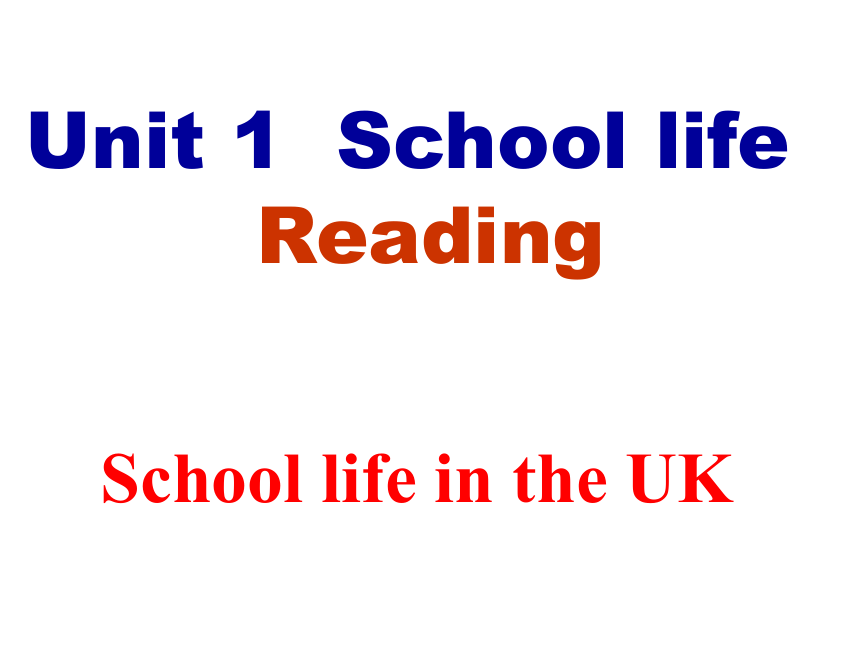
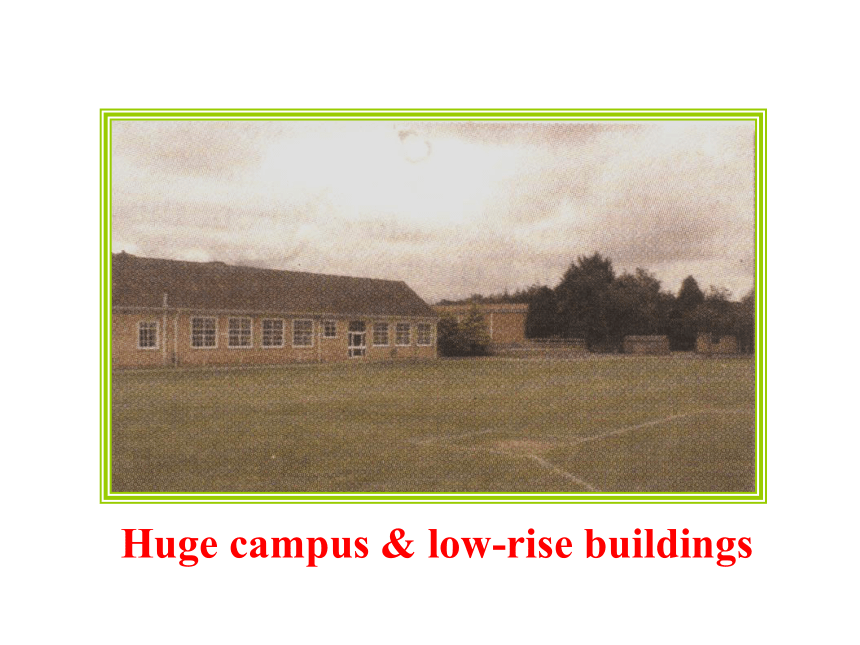

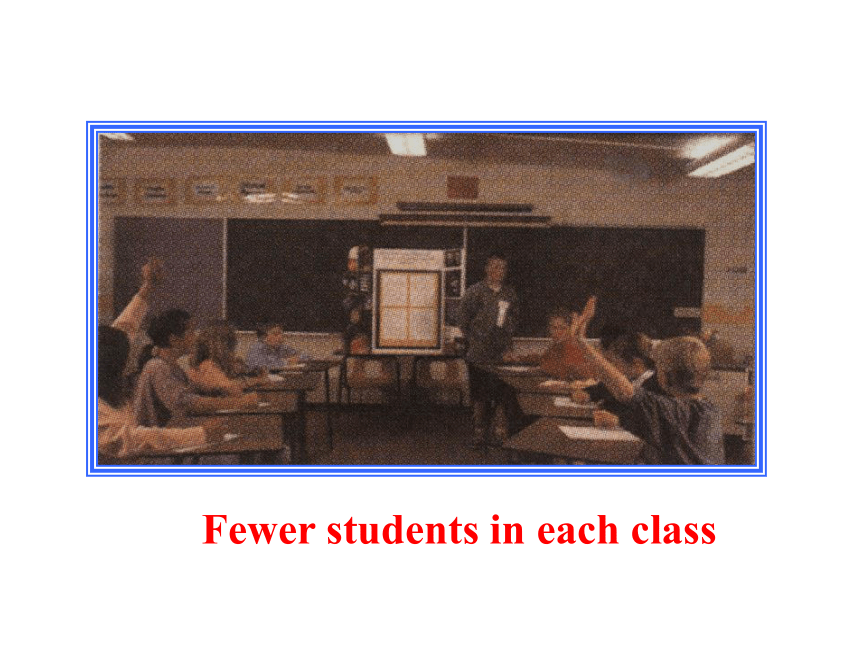
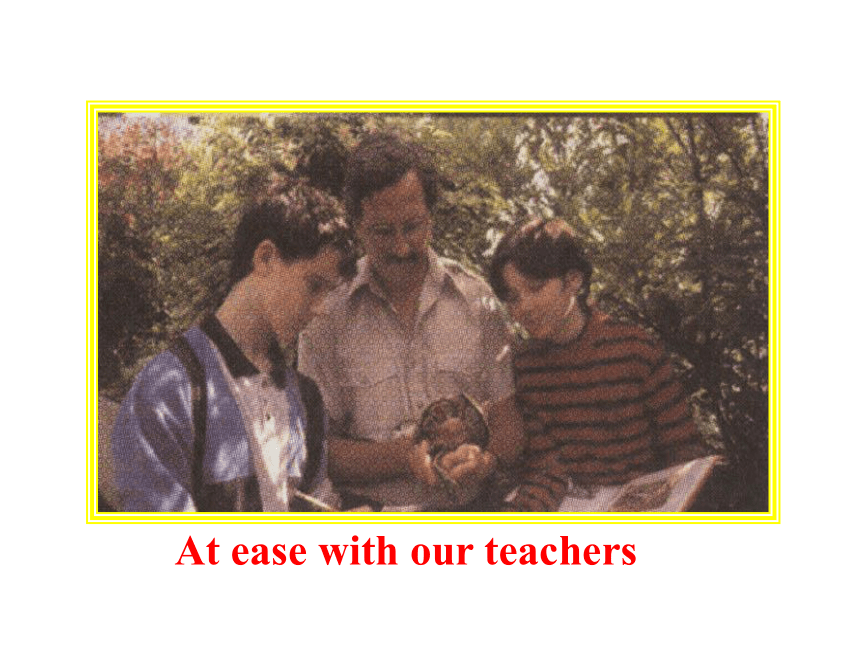
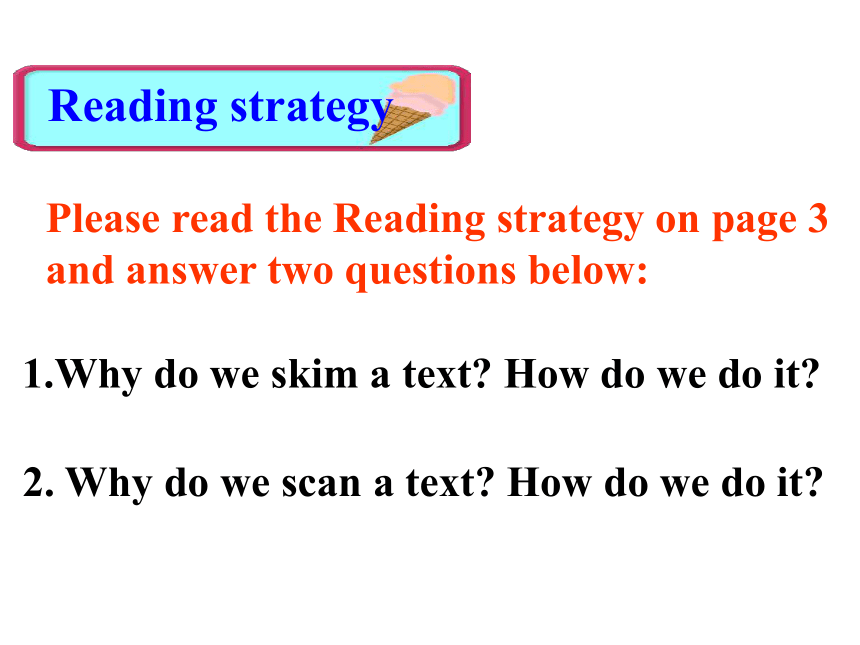
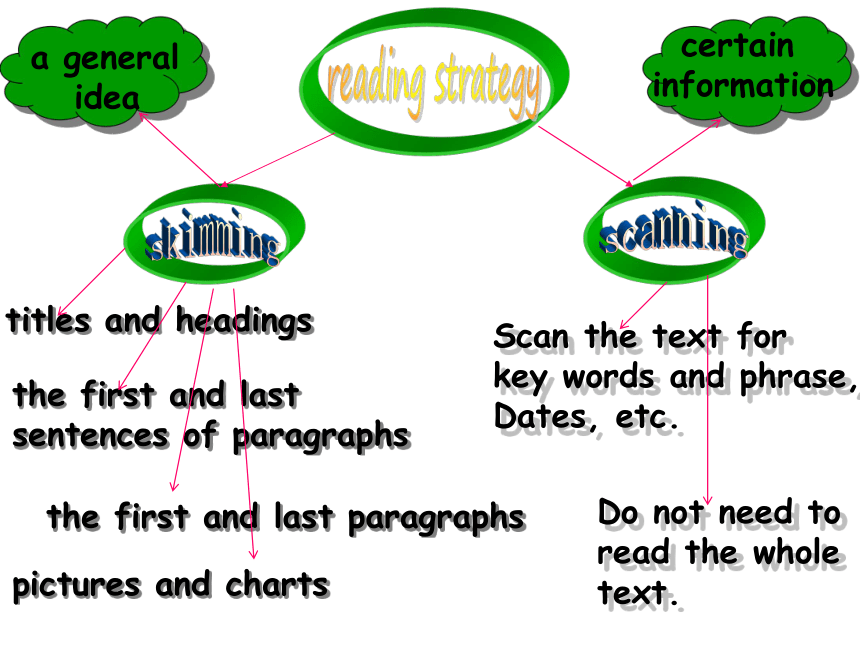
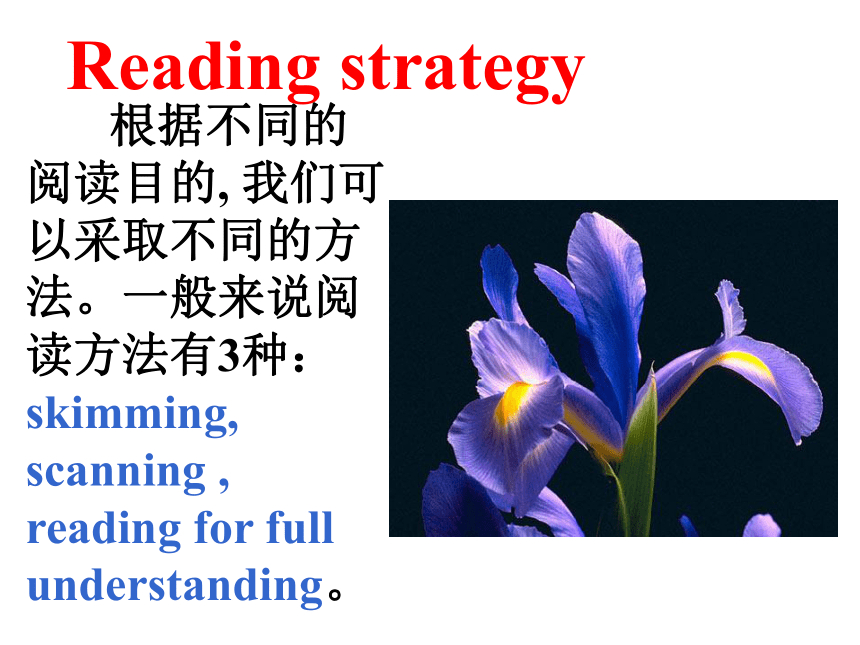
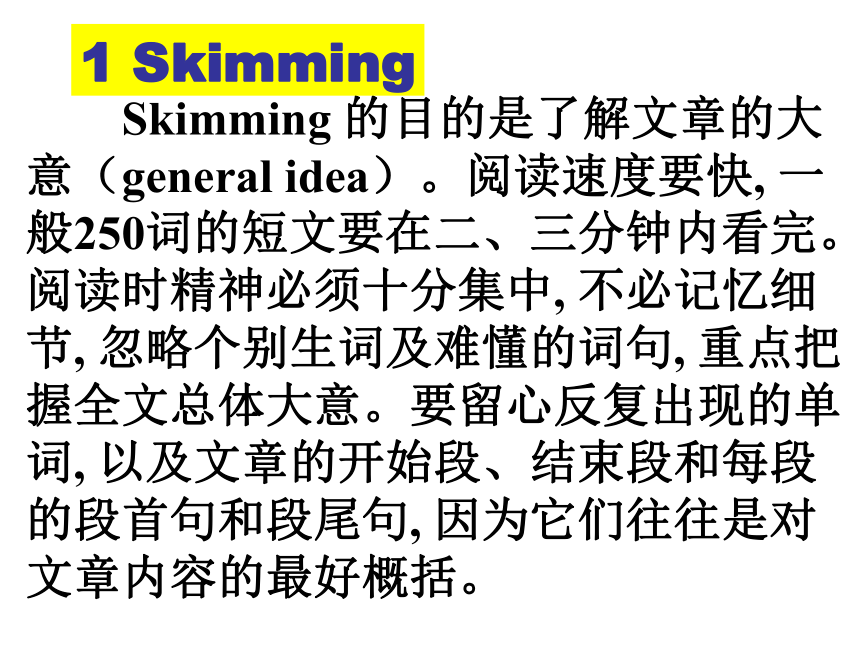
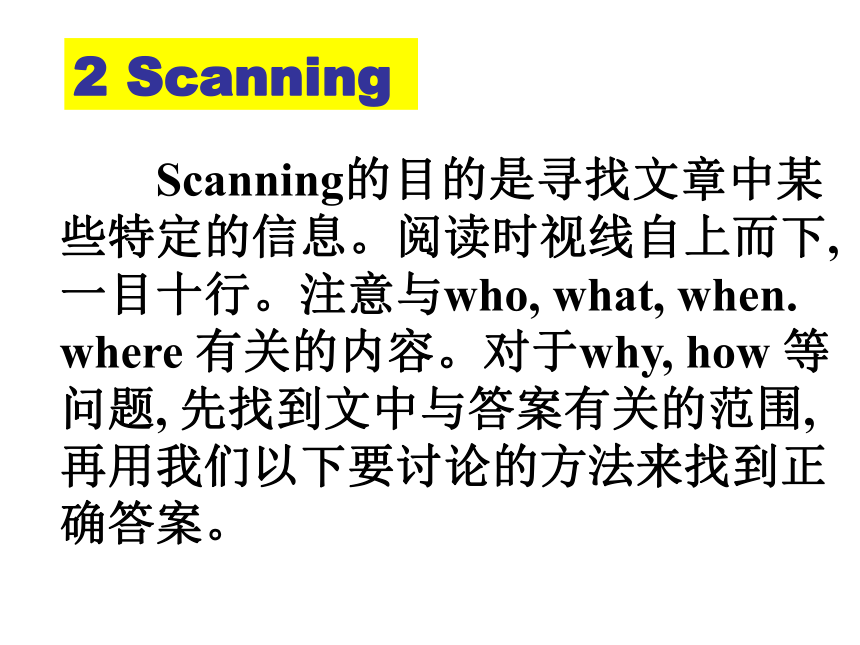
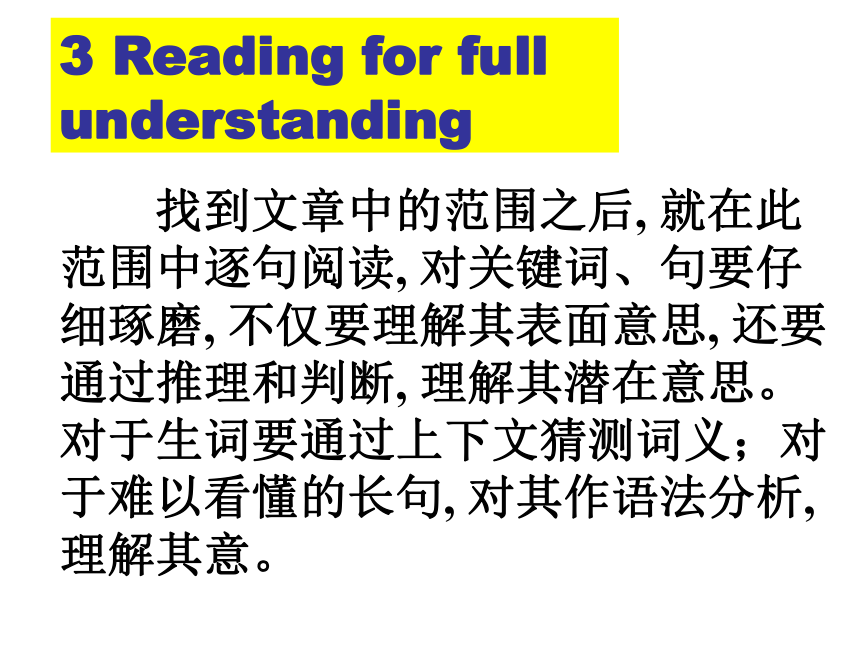
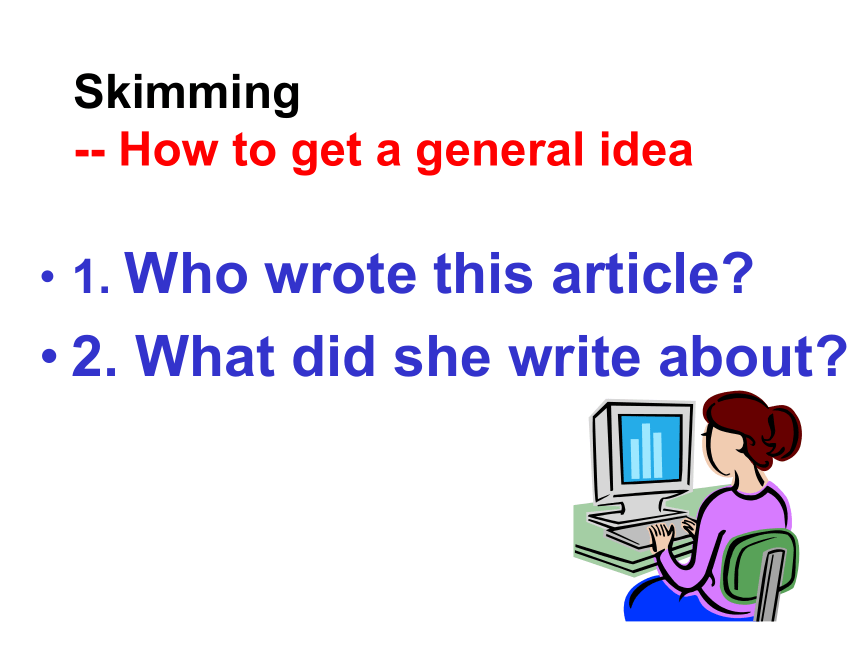
文档简介
课件100张PPT。Unit 1 School life
Reading School life in the UKHuge campus & low-rise buildings Lockers for every studentFewer students in each classAt ease with our teachers Reading strategyPlease read the Reading strategy on page 3 and answer two questions below:Why do we skim a text? How do we do it?2. Why do we scan a text? How do we do it?reading strategyskimmingscanninga general
idea certain
informationtitles and headingsthe first and last
sentences of paragraphsthe first and last paragraphspictures and chartsScan the text for
key words and phrase,
Dates, etc.Do not need to
read the whole
text. 根据不同的阅读目的, 我们可以采取不同的方法。一般来说阅读方法有3种:skimming, scanning , reading for full understanding。
Reading strategy Skimming 的目的是了解文章的大意(general idea)。阅读速度要快, 一般250词的短文要在二、三分钟内看完。阅读时精神必须十分集中, 不必记忆细节, 忽略个别生词及难懂的词句, 重点把握全文总体大意。要留心反复出现的单词, 以及文章的开始段、结束段和每段的段首句和段尾句, 因为它们往往是对文章内容的最好概括。
1 Skimming Scanning的目的是寻找文章中某些特定的信息。阅读时视线自上而下, 一目十行。注意与who, what, when. where 有关的内容。对于why, how 等问题, 先找到文中与答案有关的范围, 再用我们以下要讨论的方法来找到正确答案。
2 Scanning 找到文章中的范围之后, 就在此范围中逐句阅读, 对关键词、句要仔细琢磨, 不仅要理解其表面意思, 还要通过推理和判断, 理解其潜在意思。对于生词要通过上下文猜测词义;对于难以看懂的长句, 对其作语法分析, 理解其意。
3 Reading for full understandingSkimming -- How to get a general idea1. Who wrote this article?
2. What did she write about?
Reading strategy -- Skimming.1.We skim a text when we want to get a general idea of what it is about.
2. the title
the first and last sentences of each paragraph
the first and last paragraphs
pictures
charts
Skimmimg -- to get certain information1. How long did Wei Hua stay in Britain?
2. What was the name of Wei Hua’s class teacher?
3. What did Wei Hua make in her woodwork class?What happened on her first school day?
To attend assembly.How did she like the homework at first?
A bit challenging.Reading strategy -- scanning1. We scan the text when we want to find certain information in a text quickly.
2. key words and phrases
dates
numbers返回Par1:
1.Was she happy with the school hours? ______________
2.School in Britain _______ around 9 am and __________ about 3:30 pm.
School hours:返回Par2:
1. Who was the girl sitting next to her on the first day?_____
2. The headmaster told them about ______ during assembly.
Attending assembly:返回Par3:
1. Who was her favorite teacher?_______.
2. Was it easy for her to remember all the Ss’ faces and names? Why ? ________.
Teachers and classmates:返回Par 4 / 5 / 6:Homework and subjects:
1.The homework was not heavy,, but why was it a bit challenging for her?_.
2.Why did her English improve a lot?
3.Did she enjoy cooking? ________.
4.Do Ss have to learn all the subjects even if they don’t like them? ________.
?
返回Par 7 :
1.Why did she miss Chinese food a lot at lunchtime?_____________________. 2.She usually played on the school field. Sometimes ____. Sometimes _______.
British food and her activities:
返回Par 8:
She felt lucky and hopes ________.
Intentions:
I. Read the article again and try to answer
these questions in short sentences.Detailed Reading1.What time do British schools usually
begin?
2. On average, how many students are there in a class in the UK?British schools usually begin around 9a.m. and end at about 3.30 p.m.29.3. Why did Wei Hua find her homework difficult at the beginning of her study in the UK?
4. On Tuesdays, what did Wei Hua do in the evening?
Because all the homework was in English.She had an extra French class. 5. What do British students usually eat after their main meal?
6. Which British city did Wei Hua go to?
Manchester.Lots of desserts.Listen to the recording and decide which of the sentences below are true and which ones are false. PARTC2 Topics mentioned in the text□teachers □ students
□ friends □ subjects
□ homework □ grades
□ festivals □ timetable
□ activities □ host family
□ food □ hobbies
□ school rules □school hours
□school assembly □Woodwork class√√√√√√√√√√√√1.Which of the following statement is TRUE according to the passage?
A.?What the headmaster told them
sounded like what she used to hear in
China.
B.?She used to get up at 8 am in China.
C.?She was such a good cook that she
liked cooking British food.
D. She didn’t like History or Art, so she
chose Woodwork.2. What is the main idea of the passage?
A.?Her English improved a lot as she
used English every day.
B.?School life in the UK is busy and
bitter.
C. She had a wonderful experience in
a British school.
D.?She was happy with the British
school hours.3. Which of the following has the closest
meaning to “I could e-mail my family
and friends back home for free”?
A.?I could e-mail my family and friends
back home without paying money.
B.?I could e-mail my family and friends
back home freely.
C.?I could e-mail my family and friends in
my free time.
D.?I could be free to e-mail my family and
friends back home.4. The writer’s purpose of writing the
passage is to ______.
A.?tell us that she doesn’t like school life
in Britain
B.?excite more students to study abroad
C.?improve her English
D.?introduce her exciting and happy
school life in Britain5. She felt lucky because _______.
A.?she could get up an hour later than usual
B.?the headmaster told them to earn respect by working hard and achieving high grades
C.?she had been given a golden opportunity to study in Britain and met helpful and friendly teachers and students
D.?she improved her English Fill in the formSchool starts around 9 a.m.
and ends about 3.30 p.m.The headmaster told us
about the rules of the school
and also the best way to
earn respect from the schoolMr. Heywood, Miss Burke29, the average sizeWe had to move to different
classrooms for different
classes; we also had
different students in some
classesNot as heavy as in old school, but a bit challenging, all in English English, History, English
Literature, Computer Science, Maths, Science, PE, Art, Cooking and French; students can choose and drop some subjectsRead English books in the
library; went to the
Computer Club at lunchtime; had an extra French class on Tuesday evenings; cooking; held class party at the end of the termMade a small tableVery different; eat lots of desserts after main mealsPlayed on the school field;
football or just relaxed Reading discussion -- to find detailed informationRead the text again carefully and find out the similarities and differences between lives of British and Chinese students.Similarities:
1.The principal tells the students
about the school rules.
2 attending assembly on the first day3.one subject for each teacher
4.feeling at ease with the teachersProblem solving (group work) -- to challenge your creativity1. Prepare to interview Wei Hua.
What else do you want to know about her school life in the UK?
2. Imagine your own school life in the UK.
If you were sent to study in a high school in the UK, what would be the biggest challenge?
Have a discussion about the school uniformsAdvantages---feel like part of a group ,don’t need special care
save money and time for fashionable clothesfeel proud when playing with another school team…Disadvantages---look boring,be hard to tell one from another with the same clothes on
can’t show the students’ personalities…1. When you are taking SATS, you will______________.
A. have to find answers to some
math questions only
B. only solve some problems
C. be chosen by the best colleges
D. be tested on some math questions as well as
some problem-solving questions
2.A special counselor is a person ______
.
A. who wants to go to a very good college
B. who works in a high school to help students choose suitable colleges to go to
C. who works in a college or a university to help high school students choose suitable colleges to go to
D. who writes letter of application to colleges for high school students
Language points 1. Going to a British high school for one year was a very enjoyable and exciting experience for me.
1) experience [U]经验
Have you had any experience in work of this sort? 你对这工作有经验吗? Experience comes from practice. 经验来源于实践。She is a teacher with more than 20 years’ experience in teaching. 她是一位有20年教学经验的老师。
2) [C] 经历
The car accident was a terrible experience to him. 那起交通事故对他来说是一次可怕的经历。 Jumping from the flying plane is an unforgettable experience. 从正在飞翔的飞机上跳下来是一个难忘的经历。
3) vt 体验
He experienced the greatest hardship for the first time in his life. 他第一次体验他人生中的最大困苦。Experiencing pain is as valuable as experiencing pleasure. 体验痛苦跟体验快乐同样珍贵。
4) experienced 有经验的 如:
an experienced doctor 有经验的医生
5) be experienced in (doing ) sth 如:
He is experienced in teaching. 他对教学有经验。2. I was very happy with the school hours in Britain.
1) be happy with= be pleased with 对……满意。如:
I’m pleased with his new house. They are happy about / over / with the result of the exam.
2) be happy to do sth 乐于做某事 如:
I shall be happy to accept your invitation. 3. This means I could get up an hour later than usual…
mean doing sth 意味着做某事
mean to do sth 打算做某事 如:
If you miss this train, that will mean waiting for another 30 minutes. 如果你错过了这班火车,那就意味着你还要等30分钟。 He meant to cause trouble. 他是存心惹麻烦。2) usual a.通常的,普通的,平常的。如:
Let’s meet again at the usual place. 咱们在老地方见吧。
than usual 用于比较级之后,意为“比平常……”。如:
He got up a little earlier than usual.
他比平常早起了些。
as usual 跟往常一样, 平常, 照常。如:As usual he forgot to make his bed after he got up. 跟往常一样,他起床之后忘了叠被了。
as is usual with… 和……平日那样。如:
As is usual with him, he was late for school today. 和平日一样,他今天又迟到了。
试比较:ordinary/usual/common/4. He also told us that the best way to earn respect from the school was to work hard and achieve high grades.
1) earn v. 挣得,博得 earnings n. 所得收入 earn one’s living 自行谋生The workers earned less money because they had to pay medical insurance. 因为工人要交医疗保险,所以他们赚得的钱就少了。 The old man earned his living as a fisherman. 这老人以捕鱼为生。As we know, it’s his honesty that earned the admiration of his friends.
正如我们所知,正是他的诚实得到了朋友们的赞扬。
It’s said that a person’s intelligence and abilities have a direct effect on his or her earnings.
据说一个人的收入与其智商及能力有直接的关系。比较:earn, gain, win
earn 指为钱(或任何其他报酬)而工作,含有“报酬是应得”的含义。
win 指在竞争、战争、比赛中获胜,并可能由此得到奖赏。
gain指获得有用和需要的东西,常用于与钱没关系的场合。如:He has earned a lot of money by working part-time job.
他通过做兼职,已经挣了好多钱。
He wants to win a trip to Europe in that competition, but he will be happy if he gets a new bicycle.
他想在那场比赛中得到一个去欧洲的旅游奖,但是如果他能得到一辆新自行车,他会非常高兴。She gained enough experience while working for the newspaper. 她在为那家报社工作期间取得了足够的经验。
2) respect
用作不可数名词 a. 意为“尊敬, 敬意”,与for连用。如:
The children showed respect for old people. 儿童向老人表示敬意。I have great respect for him. 我很尊敬他。
b. 意为“尊重,重视,顾虑, 关心”。与介词for或to搭配使用。如:
We must have respect for the opinions of others. 我们必须尊重/顾虑他人的意见。
在表示“(事情的某一)点,方面”时用作可数名词。如:She is right in every respect/in many respects. 她各方面都对。
respects意为“致意,问好,请安”。如:
Give your father my respects. 代我向令尊致意。
in no respect 无论哪方在都不…… in respect to/of…= with respect to… 关于 如:I learned nothing with respect to it. 关于这件事,我没听说。
without respect to… 不管……, 不顾…… 如:
He did it without respect to the result. 他不顾后果做了那件事。
respect vt. 尊敬, 尊重, 重视 如:
I respect you for your honesty. 由于你为人正直,我对你十分敬重。 We should respect the rights of other people. 我们应尊重别人的权利。
respect oneself 自重,自尊 如:
If you don’t respect yourself, how can you expect others to respect you? 自己不自重,又怎能受到别人的尊重呢? 即学即用I’m sure she will do as she promised;
I’ve got great _________ her.
A. respect for B. respects of
C. honor of D. faith in3)achieve v. 完成, 达到 如:
The university has achieved all its goals this year. 这个大学今年已经实现了所有的奋斗目标。
achievement: [U] 完成,达到; [C] 成就, 功绩 make achievements 获得成绩,取得成就 又如:We may have the feeling of satisfaction
and achievement from our English study
when we are able to say something
simple in English.
当我们可以说点儿简单的英语交谈时,我
们就可以从英语学习中得到满足感和成
就感。The success of the experiment proves that we have made great achievements in the study of rocket.
那个实验的成功证明我们在火箭方面的
研究取得很大成就。 5. This is about the average size for British schools.
average adj. 平均的;平常的 如:
What’s the average age of the girls in your class? 你们班上女生的平均年龄是多少? It’s an average essay,so it is not impressive. 这是一篇很普通的论文,所以给人的印象不深刻。average n. 平均数,一般水平(通常不用复数形式)。如:
Alice’s maths is above the average in the class. 爱丽丝的数学成绩高于班级平均水平。on (an/the) average,there are twenty boys present every day. 平均说来,每天有二十个男孩出席。average vt. 平均达到 如: The rainfall averages 36 inches a year.6. I found the homework was not as heavy as what I used to get in my old school, but it was a bit challenging for me…
used to 过去常常做……,后跟动词原形。如:
We used to swim in this river. 过去我们经常在这条河中游泳。 My father used to smoke, but now he doesn’t. 我父亲以前常抽烟,但现在不抽了。 used to 与would的区别
表示过去的继续状态或过去的习惯(和现在和未来相比)时,通常要用used to,而不用would。在表示过去的习惯时两者都可用。但would常表示含用感情成分的主观意思,而used to 则表示较客观的意思。used to表示相当长期间的习惯,而would则表示某动作的重复,其习惯的意味较淡,因此通常与often, sometimes等词连用。如:
He used to be a naughty boy. 他从前是个顽皮的孩子。 Is this the place where you used to live? 这是你从前住过的地方吗?He would say so when he was young. 他年轻时常这么说。
We would often talk about our future on the bank of the river. 我们(过去)常在河岸上谈论我们的未来。相似短语区别:
be/get used to sth./ doing sth. 习惯于/开始习惯于做…… 如:
I am used to traveling by air and only on one occasion have I ever felt frightened. 我习惯了乘飞机旅行,只有一次我可给吓怕了。be used to do 被用来做…… 如:
In our school, candles are used to give light when electricity is cut off. 在我们学校停电时,就用蜡烛来照明。
固定短语
there used to be 某地过去有某物 如:
There used to be a swimming pool in our town. 我们镇上过去有一个游泳池。2) a bit和a little
二者都可以修饰形容词或副词的原级或比较级。如:
It’s a bit/a little cold today. 今天有点冷。 He feels a bit/a little more tired today than yesterday. 他今天觉得比昨天要更累一点。 She is driving a bit/a little faster. 她现在开得稍快了一点。a little可直接加名词,而a bit须加of后才能加名词。如:
a little bread = a bit of bread 一点儿面包 a little wood = a bit of wood 一点儿木柴 a few bits of wood 几片木片not a bit意为 “一点也不” , 相当于 not at all,而not a little则意为 “非常” ,表达肯定的意思。如:
He is not a bit surprised at the news. 他对此消息一点不吃惊。 He is not a little surprised at the news. 他对此消息非常吃惊。 He was not a little surprised. 他颇为惊讶。bit前可用人称代词,意为“某人的一份力量”,而little无此用法。little可用作不定代词,而bit无此用法。如:
We should do our bit for our country. 我们为祖国尽自己的一份力。 Little does he know about his illness. 他对病情知道得很少。3) challenge n. / v. 挑战 作动词时用于challenge … to …或challenge … to do …结构,意为“向……挑战……”。如:
The school challenged us to a game of football. 那学校向我们挑战足球赛。 He challenged me to play another tennis game. 他向我挑战要我跟他再打一场网球。The present world is full of challenges as well as opportunities. 当今社会充满了机遇与挑战。
challenging adj. 引发兴趣的,使人思考的,激发干劲的。如:
a challenging problem 发人深思的问题7. …so I could e-mail my family and friends back home for free.
free adj. 免费的;空闲的 如:
a free dinner 免费的午餐 for free (= free of charge)免费的 free time 空闲时间
All the books were given away free. 所有的书都免费赠送。8. Cooking was really fun as I learned how to buy, prepare and cook food.
1) fun n. [U]愉快;开心 adj. 有趣的,奇妙的
比较:funny adj. 好笑的,滑稽的
for fun 寻找乐趣;当作玩笑; make fun of 捉弄There’s no fun in spending the whole
evening playing cards.
整个晚上打朴克牌没有意思。
I felt unhappy whenever I was made
fun of.
无论何时被人嘲笑,总让我不好受。Fifty years ago, wealthy people
would rather hunt wild animals
for fun than go sightseeing.
五十年前,人们宁愿捕杀野生动
物来寻开心也不愿意外出观光。2) prepare: v.准备, 预备, 有能力而且愿意 preparation n. 准备, 预备 prepare for…/prepare…for… make preparations for be prepared for
Working on a part-time job can prepare them for a future career. 打工为大学生将来的工作作好准备。Will you help me prepare for the
get-together of the old classmates?
你能否帮我为这次老同学聚会做好准备工作?
Preparations for the top government
officers’ visit are almost complete.
迎接政府高级官员来访的准备工作差不多已全部完成。9. …but can drop some subjects if they don’t like them.
drop v. 1) 放弃;断绝 (往来);滴下, 落下 n. 滴;点 如:
drop sb. a line 写封短信 drop in on sb. 造访某人 drop in at some place 造访某地He seems to have dropped most of
his friends.
他好像与大多数的朋友不再来往了。
He lifted a rock only to drop it on his
own feet.
他搬起石头砸了自己的脚。
A drop of ink may make a million think.
一滴墨水写成的文字可让千万人思索。Don’t forget to drop me a line when
you are free! 有空时写封信给我!
Sorry, we are late—we drop in at a pub
on the way!
不好意思我们迟到了,我们中途去了一趟酒吧。1.The headmaster asked me to
_________ him at his office.
校长让我去他办公室。
2. _____________ when you have time.
有空时写封信给我。
3. I want to _____ out of math class,
which is too hard for me.
我不想上数学课,它对我来说太难了。drop in onDrop me a linedrop即学即用10. I missed Chinese food a lot at lunch time.
miss v. 错过;失去; 想念;思念 miss doing sth. 想念/错过做某事
He threw the ball to me, but I missed it and it landed on the ground. 他把球扔给我,但我没接住,球落在了地上。Being too tired, he narrowly missed crashing into the tree.
太累了,他差一点撞到树上。
I’m sure that everybody will miss him
very much.
我相信每个人都会怀念他。11. Sometimes I just relaxed under a tree…
relax vt. & vi. 使松弛, 放松, 松懈。如:
relax one’s muscles 放松肌肉 relax one’s attention 放松注意力 relax one’s pace 放慢步伐 relax one’s mind 使脑子得到休息His face relaxed in/into a smile.
他的表情在一笑中变得轻松了。
We must not relax in our efforts.
我们决不能松劲。
Let’s stop working and relax for an hour.
我们停工休息一小时。 比较:relaxed和relaxing
relaxed 感到轻松 relaxing 令人轻松的
He is feeling relaxed now. 他现在感到轻松。 The music is relaxing. 音乐使人轻松。 We are having relaxing weather. 天气使人懒洋洋的。 relaxation n. [U] “放松”消遣”“娱乐”。
[C]为消遣所做的具体的事
relaxation of the muscles 肌肉的放松Let’s have some relaxation. 我们放松一下。 Fishing and mountain-climbing are his favorite relaxation. 钓鱼和爬山是他最喜欢的娱乐。1. Read the text again and again and
try to recite or retell it.
2. Review all the language points we’ve
learned.
3. Preview Word Power of this unit.
4. Email your friends about your new
school life.HomeworkTips:
1. Think about what aspects you are
going to write about.
2. Your email to a friend should
sound interesting and exciting.
Reading School life in the UKHuge campus & low-rise buildings Lockers for every studentFewer students in each classAt ease with our teachers Reading strategyPlease read the Reading strategy on page 3 and answer two questions below:Why do we skim a text? How do we do it?2. Why do we scan a text? How do we do it?reading strategyskimmingscanninga general
idea certain
informationtitles and headingsthe first and last
sentences of paragraphsthe first and last paragraphspictures and chartsScan the text for
key words and phrase,
Dates, etc.Do not need to
read the whole
text. 根据不同的阅读目的, 我们可以采取不同的方法。一般来说阅读方法有3种:skimming, scanning , reading for full understanding。
Reading strategy Skimming 的目的是了解文章的大意(general idea)。阅读速度要快, 一般250词的短文要在二、三分钟内看完。阅读时精神必须十分集中, 不必记忆细节, 忽略个别生词及难懂的词句, 重点把握全文总体大意。要留心反复出现的单词, 以及文章的开始段、结束段和每段的段首句和段尾句, 因为它们往往是对文章内容的最好概括。
1 Skimming Scanning的目的是寻找文章中某些特定的信息。阅读时视线自上而下, 一目十行。注意与who, what, when. where 有关的内容。对于why, how 等问题, 先找到文中与答案有关的范围, 再用我们以下要讨论的方法来找到正确答案。
2 Scanning 找到文章中的范围之后, 就在此范围中逐句阅读, 对关键词、句要仔细琢磨, 不仅要理解其表面意思, 还要通过推理和判断, 理解其潜在意思。对于生词要通过上下文猜测词义;对于难以看懂的长句, 对其作语法分析, 理解其意。
3 Reading for full understandingSkimming -- How to get a general idea1. Who wrote this article?
2. What did she write about?
Reading strategy -- Skimming.1.We skim a text when we want to get a general idea of what it is about.
2. the title
the first and last sentences of each paragraph
the first and last paragraphs
pictures
charts
Skimmimg -- to get certain information1. How long did Wei Hua stay in Britain?
2. What was the name of Wei Hua’s class teacher?
3. What did Wei Hua make in her woodwork class?What happened on her first school day?
To attend assembly.How did she like the homework at first?
A bit challenging.Reading strategy -- scanning1. We scan the text when we want to find certain information in a text quickly.
2. key words and phrases
dates
numbers返回Par1:
1.Was she happy with the school hours? ______________
2.School in Britain _______ around 9 am and __________ about 3:30 pm.
School hours:返回Par2:
1. Who was the girl sitting next to her on the first day?_____
2. The headmaster told them about ______ during assembly.
Attending assembly:返回Par3:
1. Who was her favorite teacher?_______.
2. Was it easy for her to remember all the Ss’ faces and names? Why ? ________.
Teachers and classmates:返回Par 4 / 5 / 6:Homework and subjects:
1.The homework was not heavy,, but why was it a bit challenging for her?_.
2.Why did her English improve a lot?
3.Did she enjoy cooking? ________.
4.Do Ss have to learn all the subjects even if they don’t like them? ________.
?
返回Par 7 :
1.Why did she miss Chinese food a lot at lunchtime?_____________________. 2.She usually played on the school field. Sometimes ____. Sometimes _______.
British food and her activities:
返回Par 8:
She felt lucky and hopes ________.
Intentions:
I. Read the article again and try to answer
these questions in short sentences.Detailed Reading1.What time do British schools usually
begin?
2. On average, how many students are there in a class in the UK?British schools usually begin around 9a.m. and end at about 3.30 p.m.29.3. Why did Wei Hua find her homework difficult at the beginning of her study in the UK?
4. On Tuesdays, what did Wei Hua do in the evening?
Because all the homework was in English.She had an extra French class. 5. What do British students usually eat after their main meal?
6. Which British city did Wei Hua go to?
Manchester.Lots of desserts.Listen to the recording and decide which of the sentences below are true and which ones are false. PARTC2 Topics mentioned in the text□teachers □ students
□ friends □ subjects
□ homework □ grades
□ festivals □ timetable
□ activities □ host family
□ food □ hobbies
□ school rules □school hours
□school assembly □Woodwork class√√√√√√√√√√√√1.Which of the following statement is TRUE according to the passage?
A.?What the headmaster told them
sounded like what she used to hear in
China.
B.?She used to get up at 8 am in China.
C.?She was such a good cook that she
liked cooking British food.
D. She didn’t like History or Art, so she
chose Woodwork.2. What is the main idea of the passage?
A.?Her English improved a lot as she
used English every day.
B.?School life in the UK is busy and
bitter.
C. She had a wonderful experience in
a British school.
D.?She was happy with the British
school hours.3. Which of the following has the closest
meaning to “I could e-mail my family
and friends back home for free”?
A.?I could e-mail my family and friends
back home without paying money.
B.?I could e-mail my family and friends
back home freely.
C.?I could e-mail my family and friends in
my free time.
D.?I could be free to e-mail my family and
friends back home.4. The writer’s purpose of writing the
passage is to ______.
A.?tell us that she doesn’t like school life
in Britain
B.?excite more students to study abroad
C.?improve her English
D.?introduce her exciting and happy
school life in Britain5. She felt lucky because _______.
A.?she could get up an hour later than usual
B.?the headmaster told them to earn respect by working hard and achieving high grades
C.?she had been given a golden opportunity to study in Britain and met helpful and friendly teachers and students
D.?she improved her English Fill in the formSchool starts around 9 a.m.
and ends about 3.30 p.m.The headmaster told us
about the rules of the school
and also the best way to
earn respect from the schoolMr. Heywood, Miss Burke29, the average sizeWe had to move to different
classrooms for different
classes; we also had
different students in some
classesNot as heavy as in old school, but a bit challenging, all in English English, History, English
Literature, Computer Science, Maths, Science, PE, Art, Cooking and French; students can choose and drop some subjectsRead English books in the
library; went to the
Computer Club at lunchtime; had an extra French class on Tuesday evenings; cooking; held class party at the end of the termMade a small tableVery different; eat lots of desserts after main mealsPlayed on the school field;
football or just relaxed Reading discussion -- to find detailed informationRead the text again carefully and find out the similarities and differences between lives of British and Chinese students.Similarities:
1.The principal tells the students
about the school rules.
2 attending assembly on the first day3.one subject for each teacher
4.feeling at ease with the teachersProblem solving (group work) -- to challenge your creativity1. Prepare to interview Wei Hua.
What else do you want to know about her school life in the UK?
2. Imagine your own school life in the UK.
If you were sent to study in a high school in the UK, what would be the biggest challenge?
Have a discussion about the school uniformsAdvantages---feel like part of a group ,don’t need special care
save money and time for fashionable clothesfeel proud when playing with another school team…Disadvantages---look boring,be hard to tell one from another with the same clothes on
can’t show the students’ personalities…1. When you are taking SATS, you will______________.
A. have to find answers to some
math questions only
B. only solve some problems
C. be chosen by the best colleges
D. be tested on some math questions as well as
some problem-solving questions
2.A special counselor is a person ______
.
A. who wants to go to a very good college
B. who works in a high school to help students choose suitable colleges to go to
C. who works in a college or a university to help high school students choose suitable colleges to go to
D. who writes letter of application to colleges for high school students
Language points 1. Going to a British high school for one year was a very enjoyable and exciting experience for me.
1) experience [U]经验
Have you had any experience in work of this sort? 你对这工作有经验吗? Experience comes from practice. 经验来源于实践。She is a teacher with more than 20 years’ experience in teaching. 她是一位有20年教学经验的老师。
2) [C] 经历
The car accident was a terrible experience to him. 那起交通事故对他来说是一次可怕的经历。 Jumping from the flying plane is an unforgettable experience. 从正在飞翔的飞机上跳下来是一个难忘的经历。
3) vt 体验
He experienced the greatest hardship for the first time in his life. 他第一次体验他人生中的最大困苦。Experiencing pain is as valuable as experiencing pleasure. 体验痛苦跟体验快乐同样珍贵。
4) experienced 有经验的 如:
an experienced doctor 有经验的医生
5) be experienced in (doing ) sth 如:
He is experienced in teaching. 他对教学有经验。2. I was very happy with the school hours in Britain.
1) be happy with= be pleased with 对……满意。如:
I’m pleased with his new house. They are happy about / over / with the result of the exam.
2) be happy to do sth 乐于做某事 如:
I shall be happy to accept your invitation. 3. This means I could get up an hour later than usual…
mean doing sth 意味着做某事
mean to do sth 打算做某事 如:
If you miss this train, that will mean waiting for another 30 minutes. 如果你错过了这班火车,那就意味着你还要等30分钟。 He meant to cause trouble. 他是存心惹麻烦。2) usual a.通常的,普通的,平常的。如:
Let’s meet again at the usual place. 咱们在老地方见吧。
than usual 用于比较级之后,意为“比平常……”。如:
He got up a little earlier than usual.
他比平常早起了些。
as usual 跟往常一样, 平常, 照常。如:As usual he forgot to make his bed after he got up. 跟往常一样,他起床之后忘了叠被了。
as is usual with… 和……平日那样。如:
As is usual with him, he was late for school today. 和平日一样,他今天又迟到了。
试比较:ordinary/usual/common/4. He also told us that the best way to earn respect from the school was to work hard and achieve high grades.
1) earn v. 挣得,博得 earnings n. 所得收入 earn one’s living 自行谋生The workers earned less money because they had to pay medical insurance. 因为工人要交医疗保险,所以他们赚得的钱就少了。 The old man earned his living as a fisherman. 这老人以捕鱼为生。As we know, it’s his honesty that earned the admiration of his friends.
正如我们所知,正是他的诚实得到了朋友们的赞扬。
It’s said that a person’s intelligence and abilities have a direct effect on his or her earnings.
据说一个人的收入与其智商及能力有直接的关系。比较:earn, gain, win
earn 指为钱(或任何其他报酬)而工作,含有“报酬是应得”的含义。
win 指在竞争、战争、比赛中获胜,并可能由此得到奖赏。
gain指获得有用和需要的东西,常用于与钱没关系的场合。如:He has earned a lot of money by working part-time job.
他通过做兼职,已经挣了好多钱。
He wants to win a trip to Europe in that competition, but he will be happy if he gets a new bicycle.
他想在那场比赛中得到一个去欧洲的旅游奖,但是如果他能得到一辆新自行车,他会非常高兴。She gained enough experience while working for the newspaper. 她在为那家报社工作期间取得了足够的经验。
2) respect
用作不可数名词 a. 意为“尊敬, 敬意”,与for连用。如:
The children showed respect for old people. 儿童向老人表示敬意。I have great respect for him. 我很尊敬他。
b. 意为“尊重,重视,顾虑, 关心”。与介词for或to搭配使用。如:
We must have respect for the opinions of others. 我们必须尊重/顾虑他人的意见。
在表示“(事情的某一)点,方面”时用作可数名词。如:She is right in every respect/in many respects. 她各方面都对。
respects意为“致意,问好,请安”。如:
Give your father my respects. 代我向令尊致意。
in no respect 无论哪方在都不…… in respect to/of…= with respect to… 关于 如:I learned nothing with respect to it. 关于这件事,我没听说。
without respect to… 不管……, 不顾…… 如:
He did it without respect to the result. 他不顾后果做了那件事。
respect vt. 尊敬, 尊重, 重视 如:
I respect you for your honesty. 由于你为人正直,我对你十分敬重。 We should respect the rights of other people. 我们应尊重别人的权利。
respect oneself 自重,自尊 如:
If you don’t respect yourself, how can you expect others to respect you? 自己不自重,又怎能受到别人的尊重呢? 即学即用I’m sure she will do as she promised;
I’ve got great _________ her.
A. respect for B. respects of
C. honor of D. faith in3)achieve v. 完成, 达到 如:
The university has achieved all its goals this year. 这个大学今年已经实现了所有的奋斗目标。
achievement: [U] 完成,达到; [C] 成就, 功绩 make achievements 获得成绩,取得成就 又如:We may have the feeling of satisfaction
and achievement from our English study
when we are able to say something
simple in English.
当我们可以说点儿简单的英语交谈时,我
们就可以从英语学习中得到满足感和成
就感。The success of the experiment proves that we have made great achievements in the study of rocket.
那个实验的成功证明我们在火箭方面的
研究取得很大成就。 5. This is about the average size for British schools.
average adj. 平均的;平常的 如:
What’s the average age of the girls in your class? 你们班上女生的平均年龄是多少? It’s an average essay,so it is not impressive. 这是一篇很普通的论文,所以给人的印象不深刻。average n. 平均数,一般水平(通常不用复数形式)。如:
Alice’s maths is above the average in the class. 爱丽丝的数学成绩高于班级平均水平。on (an/the) average,there are twenty boys present every day. 平均说来,每天有二十个男孩出席。average vt. 平均达到 如: The rainfall averages 36 inches a year.6. I found the homework was not as heavy as what I used to get in my old school, but it was a bit challenging for me…
used to 过去常常做……,后跟动词原形。如:
We used to swim in this river. 过去我们经常在这条河中游泳。 My father used to smoke, but now he doesn’t. 我父亲以前常抽烟,但现在不抽了。 used to 与would的区别
表示过去的继续状态或过去的习惯(和现在和未来相比)时,通常要用used to,而不用would。在表示过去的习惯时两者都可用。但would常表示含用感情成分的主观意思,而used to 则表示较客观的意思。used to表示相当长期间的习惯,而would则表示某动作的重复,其习惯的意味较淡,因此通常与often, sometimes等词连用。如:
He used to be a naughty boy. 他从前是个顽皮的孩子。 Is this the place where you used to live? 这是你从前住过的地方吗?He would say so when he was young. 他年轻时常这么说。
We would often talk about our future on the bank of the river. 我们(过去)常在河岸上谈论我们的未来。相似短语区别:
be/get used to sth./ doing sth. 习惯于/开始习惯于做…… 如:
I am used to traveling by air and only on one occasion have I ever felt frightened. 我习惯了乘飞机旅行,只有一次我可给吓怕了。be used to do 被用来做…… 如:
In our school, candles are used to give light when electricity is cut off. 在我们学校停电时,就用蜡烛来照明。
固定短语
there used to be 某地过去有某物 如:
There used to be a swimming pool in our town. 我们镇上过去有一个游泳池。2) a bit和a little
二者都可以修饰形容词或副词的原级或比较级。如:
It’s a bit/a little cold today. 今天有点冷。 He feels a bit/a little more tired today than yesterday. 他今天觉得比昨天要更累一点。 She is driving a bit/a little faster. 她现在开得稍快了一点。a little可直接加名词,而a bit须加of后才能加名词。如:
a little bread = a bit of bread 一点儿面包 a little wood = a bit of wood 一点儿木柴 a few bits of wood 几片木片not a bit意为 “一点也不” , 相当于 not at all,而not a little则意为 “非常” ,表达肯定的意思。如:
He is not a bit surprised at the news. 他对此消息一点不吃惊。 He is not a little surprised at the news. 他对此消息非常吃惊。 He was not a little surprised. 他颇为惊讶。bit前可用人称代词,意为“某人的一份力量”,而little无此用法。little可用作不定代词,而bit无此用法。如:
We should do our bit for our country. 我们为祖国尽自己的一份力。 Little does he know about his illness. 他对病情知道得很少。3) challenge n. / v. 挑战 作动词时用于challenge … to …或challenge … to do …结构,意为“向……挑战……”。如:
The school challenged us to a game of football. 那学校向我们挑战足球赛。 He challenged me to play another tennis game. 他向我挑战要我跟他再打一场网球。The present world is full of challenges as well as opportunities. 当今社会充满了机遇与挑战。
challenging adj. 引发兴趣的,使人思考的,激发干劲的。如:
a challenging problem 发人深思的问题7. …so I could e-mail my family and friends back home for free.
free adj. 免费的;空闲的 如:
a free dinner 免费的午餐 for free (= free of charge)免费的 free time 空闲时间
All the books were given away free. 所有的书都免费赠送。8. Cooking was really fun as I learned how to buy, prepare and cook food.
1) fun n. [U]愉快;开心 adj. 有趣的,奇妙的
比较:funny adj. 好笑的,滑稽的
for fun 寻找乐趣;当作玩笑; make fun of 捉弄There’s no fun in spending the whole
evening playing cards.
整个晚上打朴克牌没有意思。
I felt unhappy whenever I was made
fun of.
无论何时被人嘲笑,总让我不好受。Fifty years ago, wealthy people
would rather hunt wild animals
for fun than go sightseeing.
五十年前,人们宁愿捕杀野生动
物来寻开心也不愿意外出观光。2) prepare: v.准备, 预备, 有能力而且愿意 preparation n. 准备, 预备 prepare for…/prepare…for… make preparations for be prepared for
Working on a part-time job can prepare them for a future career. 打工为大学生将来的工作作好准备。Will you help me prepare for the
get-together of the old classmates?
你能否帮我为这次老同学聚会做好准备工作?
Preparations for the top government
officers’ visit are almost complete.
迎接政府高级官员来访的准备工作差不多已全部完成。9. …but can drop some subjects if they don’t like them.
drop v. 1) 放弃;断绝 (往来);滴下, 落下 n. 滴;点 如:
drop sb. a line 写封短信 drop in on sb. 造访某人 drop in at some place 造访某地He seems to have dropped most of
his friends.
他好像与大多数的朋友不再来往了。
He lifted a rock only to drop it on his
own feet.
他搬起石头砸了自己的脚。
A drop of ink may make a million think.
一滴墨水写成的文字可让千万人思索。Don’t forget to drop me a line when
you are free! 有空时写封信给我!
Sorry, we are late—we drop in at a pub
on the way!
不好意思我们迟到了,我们中途去了一趟酒吧。1.The headmaster asked me to
_________ him at his office.
校长让我去他办公室。
2. _____________ when you have time.
有空时写封信给我。
3. I want to _____ out of math class,
which is too hard for me.
我不想上数学课,它对我来说太难了。drop in onDrop me a linedrop即学即用10. I missed Chinese food a lot at lunch time.
miss v. 错过;失去; 想念;思念 miss doing sth. 想念/错过做某事
He threw the ball to me, but I missed it and it landed on the ground. 他把球扔给我,但我没接住,球落在了地上。Being too tired, he narrowly missed crashing into the tree.
太累了,他差一点撞到树上。
I’m sure that everybody will miss him
very much.
我相信每个人都会怀念他。11. Sometimes I just relaxed under a tree…
relax vt. & vi. 使松弛, 放松, 松懈。如:
relax one’s muscles 放松肌肉 relax one’s attention 放松注意力 relax one’s pace 放慢步伐 relax one’s mind 使脑子得到休息His face relaxed in/into a smile.
他的表情在一笑中变得轻松了。
We must not relax in our efforts.
我们决不能松劲。
Let’s stop working and relax for an hour.
我们停工休息一小时。 比较:relaxed和relaxing
relaxed 感到轻松 relaxing 令人轻松的
He is feeling relaxed now. 他现在感到轻松。 The music is relaxing. 音乐使人轻松。 We are having relaxing weather. 天气使人懒洋洋的。 relaxation n. [U] “放松”消遣”“娱乐”。
[C]为消遣所做的具体的事
relaxation of the muscles 肌肉的放松Let’s have some relaxation. 我们放松一下。 Fishing and mountain-climbing are his favorite relaxation. 钓鱼和爬山是他最喜欢的娱乐。1. Read the text again and again and
try to recite or retell it.
2. Review all the language points we’ve
learned.
3. Preview Word Power of this unit.
4. Email your friends about your new
school life.HomeworkTips:
1. Think about what aspects you are
going to write about.
2. Your email to a friend should
sound interesting and exciting.
